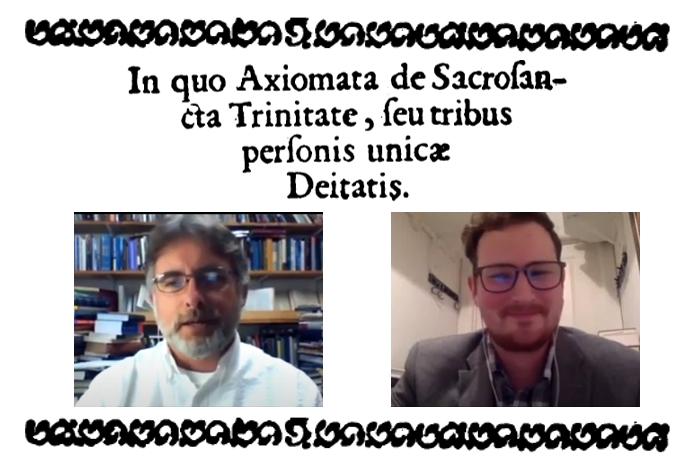
Axiom 5 is very short, but Axiom 6 is very long. So even though this is organizationally strange, we’re devoting one discussion to Axiom 5 and the first half of Axiom 6. But in our next discussion, we’ll only cover the second half of 6, so we’ll be back on track.
I’ve added an index page which will have a complete table of contents for all the posts, for your handy reference.
Axiom 5. The persons of the deity are one according to essence. Further, when compared among themselves, they are on par or equal, because each possesses commonly the essential perfection which is whole in all of them and whole in the individual persons. This is because it is the whole deity equal in its perfection.
and
Axiom 6. The persons of the deity are not distinguished among themselves essentially nor according to existence, which is common because their essence is one. Nevertheless, they are distinguished really, because one person is produced from another. And for that reason the persons differ by an incommunicable property—namely, according to the subsisting which is proper to each person. The Son receives his subsisting from the Father, as from the principle of his personality; the Holy Spirit receives his subsisting from Father and Son, again as from the principle of his personality. The principle and principled are not the same in reality. One who receives existence from another is necessarily distinguished from him in actual reality—for it cannot be the case that someone is produced from himself. The Son receives existence from the Father, and the Holy Spirit receives existence from Father and Son. Therefore, the persons are distinguished among themselves in actual reality, so that the Father is one reality, the Son is another reality, and the Holy Spirit is another reality. And by no means is the person of the Father and the Son and the Holy Spirit the same person, neither are the person of the Son and the Holy Spirit the same. Scripture teaches this with utmost clarity:
“In the beginning was the Word, and that Word was with God, and that Word was God. And the Word was made flesh, and dwelt among us (and we beheld his glory—glory, indeed, as of the only begotten proceeding from the Father), he being full of grace and truth. No one has ever seen God. The only begotten Son, who is in the bosom of the Father, he has made him known to us” (John 1:1, 14, 18).
And:
“Then, John testified, saying, I saw the Spirit descending as a dove from heaven, who also remained upon him. And I did not know him, but he who sent me to baptize with water, he said to me, Upon whom you see the Spirit descending and remaining upon him, he it is who baptizes with the Holy Spirit. So I have seen and testify that this one is the Son of God” (vv. 32–34).
And:
“And Jesus responded to them, My Father is working until now, and I am working. For this reason therefore the Jews strove even more to destroy him, because not only did he break the Sabbath, but he even said God was his Father, making himself equal to God. Thus Jesus responded and said to them, Amen, amen, I say to you: the Son cannot work from himself, that is, unless he sees the Father working. For whatever he does, this the Son does equally,” etc. (5:17–19ff).
And:
“Do you not believe that I am in the Father and the Father is in me? The words which I speak to you, I do not speak from myself; but the Father, who remains in me, he himself does the works” (14:10).
“But if his Spirit who revived Jesus from the dead lives in you all, then he who raised Christ from the dead will vivify also your mortal bodies through the inhabitation of his Spirit in you” (Rom. 8:11).
And likewise throughout in all those passages where the Father is said to be other than the Son, and the Holy Spirit other than the Father and Son—such as John 5:32:
“There is another who witnesses about me, and I know that the witness which he witnesses about me is reliable”; “I will ask the Father, and he will give another comforter to you, to remain with you unto eternity” (John 14:16).
No notes to add this week, but if I did add notes, they would be the beginnings of a lexicon of key terms for scholastic trinitarian theology. That would be cool.